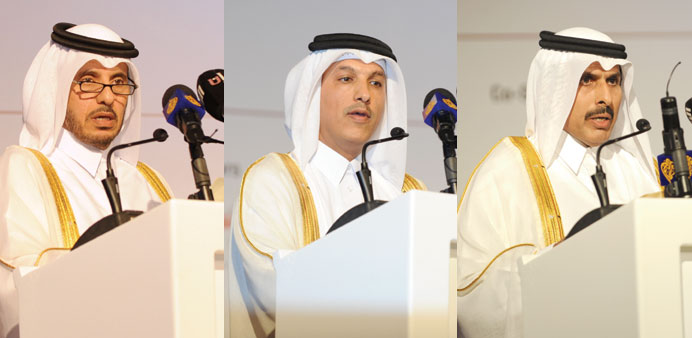HE Sheikh Abdullah bin Nasser bin Khalifa al-Thani; HE Ali Sharif al-Emadi and HE Sheikh Abdullah bin Saud al-Thani addressing the Euromoney conference yesterday.
By Santhosh V Perumal
Qatar, which seeks to reduce its reliance on the hydrocarbon sector and keep inflation under control, will continue to make higher allocations for health and education in its next budget.
“We expect the oil and gas sector to have a limited growth impact on the country’s gross domestic product in the foreseeable future,” HE the Prime Minister and interior Minister Sheikh Abdullah bin Nasser bin Khalifa al-Thani told the Euromoney conference.
He said the new phase of growth requires the government to focus more on diversification of the growth drivers of the economy and supporting the development and expansion in non-oil sectors to boost economic growth in the country.
Asserting that the development of the non-oil sector would be through public private partnership; the premier said government would make all efforts to clear the obstacles that come in the way to encourage entrepreneurship and small and medium enterprises.
“Financial stability requires sound fiscal policies and the development of a financial system that can cope with risks and boost the capacity of the national economic system to absorb risks,” HE the Finance Minister Ali Sharif al-Emadi said.
Qatar, which has smoothly braved the odds of global financial crisis, would focus on providing financial support for projects in the non-oil sectors as part of diversifying the economy and expanding the contribution of the non-oil sectors in economy.
Qatar plans to spend about $140bn in infrastructure projects, ahead of holding the 2022 World Cup.
Al-Emadi said the fiscal policy will focus on supporting these projects through optimal utilisation and balancing between costs and outcomes and co-ordination between projects to avoid pressures on services and public utilities in addition to controlling inflation.
HH the Emir Sheikh Tamim bin Hamad al-Thani, in his first address to Council of Ministers, had said the priority would be to contain inflation and eliminating monopolies.
Higher rents, coupled with costlier food and entertainment, led Qatar’s annual inflation to touch 2.8% in October, according to official figures.
Indicating a build-up of inflation expectations in the economy, the top five of the influential eight commodities group witnessed faster price rise year-on-year in October this year.
Taking cue from HH the Emir, the Qatar Chamber has already doubled its efforts by creating various sub committees to look into the larger issue of controlling inflation and dismantling monopolies.
Within the budget, health and education will continue to see higher allocations in order to achieve the goals of Qatar National Vision 2030, al-Emadi said.
Qatar Central Bank Governor HE Sheikh Abdullah bin Saud al-Thani gave an overview of the country’s banking sector and outlined the recent financial sector reforms in order to position the country as a financial hub for the region.
“We have launched initiatives to promote the effectiveness of the finance sector in reducing risk, developing capital markets, and increasing the stability of financial processes,” he said.
Total assets of banks stood at QR800bn in November this year, showing a growth of 12%. Customer deposits grew 20%; while loans were up 12% during the period.
Sheikh Abdullah also reiterated Qatar’s efforts to establish a credit rating agency for bonds.
The rating agency, which will be set up jointly by the central bank and Qatar Holding, would help local companies in accessing capital markets. But he did not specify by when it will be established. Page 2
No plans to issue debt on international markets in ’14
Qatar has no plans to issue debt on international markets next year and will adjust as necessary its hitherto fixed offerings of local currency debt,” HE the Finance Minister Ali Sharif al-Emadi said yesterday.
Asked if Qatar planned to issue debt on the international markets next year, al-Emadi told Reuters on the sidelines of a financial conference in Doha: “No, nothing.”
“We are going to focus on the local market and it will be used for monetary purposes. It is only for monetary and liquidity management. That’s about it,” he said in his first public comments since his appointment in June.
Qatar last came to the international market with a $4bn three-tranche sukuk issue in July 2012, which attracted an order book worth more than $25bn.
The Qatar Central Bank has conducted monthly auctions of 91-, 182- and 273-day T-bills since 2011, consistently draining the same amount of 4bn riyals ($1.1bn) despite build-ups of excess liquidity as well as a recent fall in demand.
In March, the central bank launched debt sales worth a total 4bn riyals in three- and five-year local currency government bonds and sukuk in quarterly issues allocated directly to banks.
But al-Emadi said the volumes drained from the market through local debt issues may be changed flexibly in the coming months, echoing April remarks by QCB Governor HE Sheikh Abdullah bin Saud al-Thani.
“We are very much dynamic, comparing the models. We always look at the market and if it is required we will be flexible when we need to,” he said.
Qatar, the world’s top liquefied natural gas exporter, may need more active liquidity management in coming years as it plans to spend some $140bn on infrastructure building, partly in preparation for hosting the 2022 World Cup soccer tournament.

